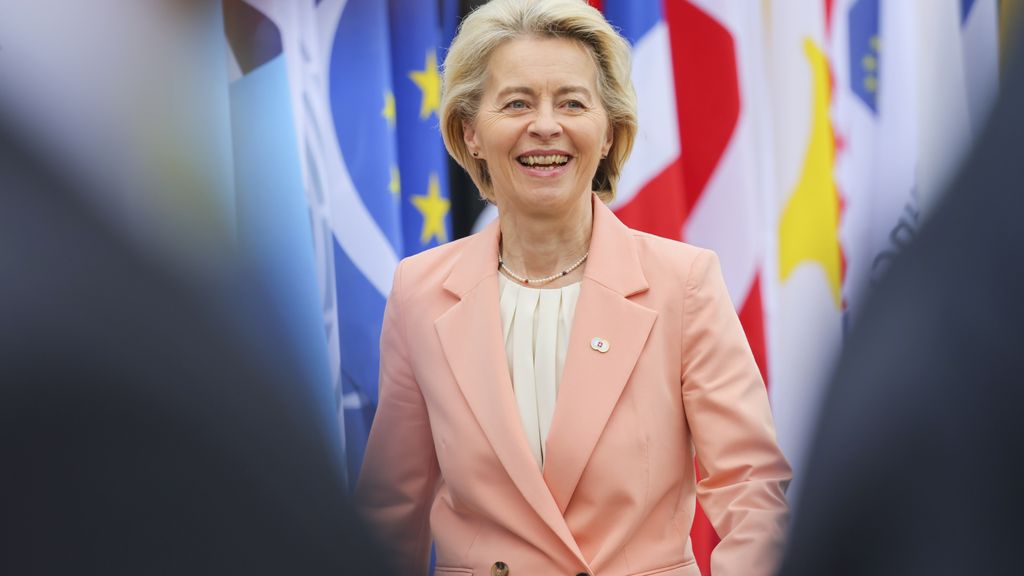News News•
-
Sadistic savior
EU Correspondent
-
Sadistic savior
EU Correspondent
Will Ursula von der Leyen become European Commission president again? The German Christian Democrat, who has held the powerful post for the past five years, needs the support of a majority of the new 720 MEPs.
Strasbourg residents are due to vote on Thursday on whether to re-instate it. 720 divided by 2 plus 1 equals 361: The calculator app is working overtime among EU observers in Strasbourg these days.
Von der Leyen has been widely praised for her decisive actions in times of crisis. Her commission has steered the EU through the coronavirus pandemic, put the ambitious Green Deal climate plans on the agenda, and campaigned in support of Ukraine against Russian aggressors.
But there is a downside. European farmers are victims of tough climate regulations, and Brussels is hogging too much power, say its opponents. They want a radical overhaul of the current EU.
Faction defectors
The European Parliament is more divided than ever. Can the German workaholic, as von der Leyen is known, succeed? She seems to be able to count on her European People’s Party, the Christian Democratic faction that is the largest in the parliament with 188 seats.
Apparently, because it is a secret ballot in which each MEP decides for himself. She must take into account dissenters within her group. And how can she muster votes from other European groups to get the necessary 361 seats?
“No,” says the far right.
Immediately after the European elections in early June, it became clear that von der Leyen’s EPP wanted to continue the old “centre alliance” with the European Social Democrats and liberals (Renew). But the strong growth of far-right parties across Europe has made the power of the “centre” less clear.
Far-right parties are now spread across three groups in the European Parliament. In addition to the European Conservatives and Reformists (the European Council led by Italian Prime Minister Meloni), two new factions have emerged.
The Patriots for Europe party includes the parties of Orbán, Wilders and Le Pen. The Alternative for Germany party is in charge of the Europe of Sovereign States faction. Together, the far-right, which mostly opposes a second term for von der Leyen, holds more than a quarter of the seats in parliament.
Making promises
For the Germans to be sure of their case, they have to make promises. It’s the usual horse trading that’s heard in the corridors. “The factions want commitments on policies they consider important,” says Tom Berndsen, a CDA MEP who, like von der Leyen, is a member of the European People’s Party.
He says his condition for backing it is “a less bureaucratic Brussels”. “It should no longer impose things to six decimal places on member states. A country like the Netherlands would find itself stuck with very tight regulations.”
With slight hesitation
In 2019, the European Green Party abstained when von der Leyen was a candidate. Daniel Freund, a German Green MEP, says the Greens’ reticence against von der Leyen has to do with “her questionable actions against rule-of-law violators like Orbán.”
At the end of 2023, von der Leyen gave her blessing to the distribution of €10 billion in EU support money to Hungary, which had until then been frozen due to corruption in Hungary. “She intervened too little and too late against the advance of ‘illiberals’ like Orbán,” Freund said.
However, the MEP believes that the Greens will largely back von der Leyen “with a slight hesitation” in return for her promise to continue investing in the Green Deal. In addition, the Greens are aware that a potential failure of her candidacy would only be welcomed by politicians like Orbán who are on a collision course with Brussels.
High shares
“It’s a shame that the Greens have changed their position,” says Anja Hazekamp, an MP for the Party for the Animals, whose party is part of the European Left faction. She calls Von der Leyen a “weather vane.”
When it came to introducing European legislation to combat the production of agricultural poison, she says, “von der Leyen was persuaded by the big companies that produce this poison.” She points to the decision taken by the agency earlier this year not to halve the use of pesticides by 2030.
“Now that the far right is shouting ‘less, less’ on issues like immigration and climate, I feel very sad,” says Hazekamp. “Will you also give in to that in the coming years?”
The most striking part of the “bargaining” in recent days has been the awarding of a number of senior positions in the European Parliament to the eurosceptic ECR group. In return, several MEPs are expected to vote for Von der Leyen.





